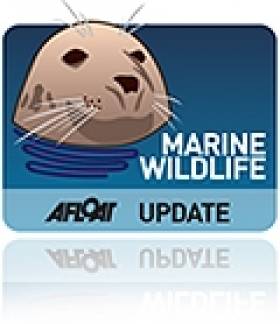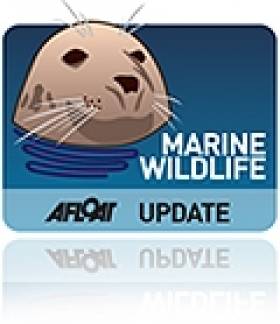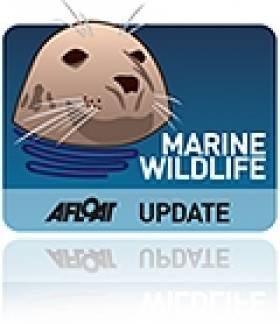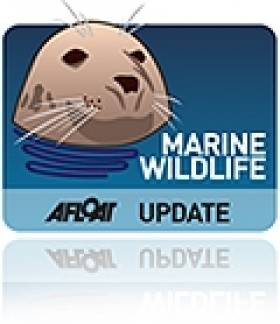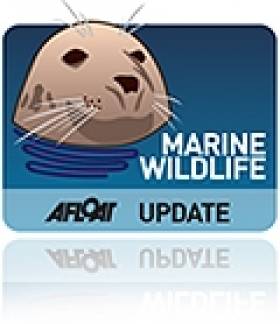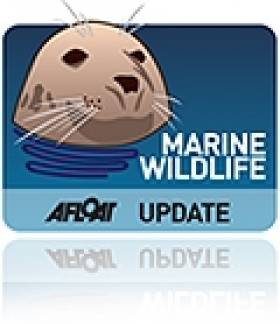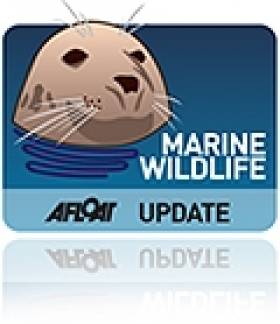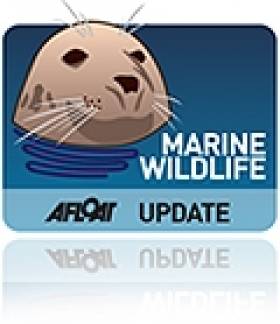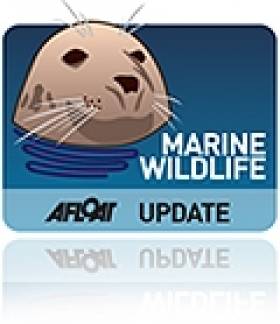Displaying items by tag: basking sharks
#MarineWildlife - Bathers enjoying yesterday's fine weather in Cork Harbour got up close and personal with a massive basking shark, as some amazing photos on TheJournal.ie and video on Facebook attest.
Yet as regular readers of Afloat.ie know very well, people had nothing to fear from the giant fish as it swam among them - as its diet consists solely of plankton.
The remarkable scene comes just says after a group of at least 12 fin whales was spotted in the Celtic Sea off Pembrokeshire from a ferry crossing from France to Ireland - a possible indicator that the gentle giants might be feeding in the area year-round, according to BBC News.
On a similar note, the Daily Telegraph has a gallery of some of Kent photographer Terry Whittaker's images of dolphins at play and interacting with humans around Britain and Ireland.
But it was a different story off Manhattan Beach in Los Angeles earlier this week, as Mail Online reports, as a group of paddleboarders were joined by what appeared to be a great while shark - the ocean's deadliest predator.
"Once you see it, your knees kind of go weak," said Bo Bridges, who captured some scary close-up images of the dangerous fish with a drone-mounted camera.
'World's First' As Researchers Attach Camera To Basking Shark
#MarineWildlife - Marine researchers have attached a video camera to the dorsal fin of a basking shark off Donegal in what's described as a "world's first".
RTÉ News reports that the footage captured by the team from the Irish Basking Shark Project, who affixed their camera to the giant six-metre shark off Malin Head last month.
Team spokesperson Emmett Johnston remarked on the basking shark bonanza off Donegal at present, commenting that the research "haven't seen sharks in such good numbers since 2010".
As previously reported on Afloat.ie, the gathering of beasts was a surprise for an angling kayaker who posted his own video of being 'stalked' by a basking shark off the Inishowen Peninsula.
But he was never in any real danger as despite their fearsome appearance, the gentle giants live on a diet of plankton.
Rare Ocean Wildlife a Treat for Atlantic Explorers
#MarineWildlife - An Irish marine research vessel has returned from an Atlantic Ocean voyage with tales of exotic new wildlife in the depths southwest of Ireland.
As The Irish Times reports, remarkable finds such as two-century-old clams and oysters, an endangered sailfin roughshark, a massive sponge and a giant hydroid - a rare relation to jellyfish and coral - were among the marine wildlife recorded by researchers on the RV Celtic Explorer in the Whittard Canyon on the Irish Atlantic margin.
Dr Louise Allcock of NUI Galway, who led the Marine Institute team on the ocean survey, said it was "part of an ongoing effort to understand Ireland's deep-sea biodiversity".
In a similar process to that used by the group who made new marine discoveries at Rockall recently, the Marine Institute team used a submersible remotely operated vehicle (ROV) to collect images and samples from the ocean chasm that's twice as deep as the Grand Canyon.
Some of those samples may aid in antibacterial and pharmaceutical research, the team explained.
The Irish Times has much more on the story HERE.
In other marine wildlife news, the Belfast Telegraph fears that "chilly seas" could be keeping basking sharks at bay from Northern Ireland's waters, as the first sighting of the year was recorded last month.
Reports from various sources indicate that water temperatures are 2 to 3 degrees lower than normal for this time of year, inhibiting the blooming of plankton that are the main source of food for the second-largest fish in the sea.
And the numbers say it all, with the Irish Whale and Dolphin Group (IWDG) confirming only 19 sightings of basking sharks around the island of Ireland as of the end of May this year, compared to 84 in the same period in 2012 - although more were spotted earlier this month off Malin Head, as the video below shows:
Donegal Shark Prank Not So Funny After All
#MarineWildlife - Recent hijinks by a group of Irish surfers in 'shark-infested waters' off Donegal have been making the rounds online - but they're not all what they seem.
IrishCentral reports on the video, apparently posted by surfers from Rossnowlagh, which shows the group on a RIB pushing one of their own overboard into the path of an oncoming shark.
Yet despite their reactions, they were never in any danger, as the shark was one of Ireland's harmless giants - a basking shark - who clearly attempts to dodge the dinghy as it approaches.
Indeed, the shark may even have been in more danger from the surfers than they were from it, as the marine species is designated as protected under EU law, which makes it illegal to disturb or harass them.
As reported on Afloat.ie earlier this year, the UK's Shark Trust has published a code of conduct for anyone encountering basking sharks in British or Irish waters - and pushing someone overboard on top of one is definitely absent from the list.
#MARINE WILDLIFE - The East Coast of Ireland was treated to a rare sight yesterday morning with the spotting of a basking shark at Dun Laoghaire.
According to the Irish Whale and Dolphin Group (IWDG), the gentle giant was sighted by Ronan McLaughlin of the Naval Service vessel LE Ciara at the entrance to Dun Laoghaire Harbour - which may allow for the perfect opportunity to easily observe the visitor.
IWDG sightings co-ordinator Pádraig Whooley said: "So far 2012 has been another very good year for sightings of this 'honorary whale', with 78 validated sightings to date, almost all of which have come from the south and west coasts."
He added: "In recent years only between 1-5% of all basking shark sightings have been off the Irish East Coast, which is at odds with the fact that [the] nearby Isle of Man is considered to be one of the best sites to observe the planet’s second biggest shark species."
Basking sharks are protected under EU law, which makes it illegal to disturb or harass them.
As previously reported on Afloat.ie, the UK's Shark Trust has published a code of conduct for anyone encountering basking sharks in British or Irish waters this summer.
Basking Sharks Return to British and Irish Waters
#MARINE WILDLIFE - The second largest fish in the sea is making its return to British and Irish waters - and experts are calling on the general public to report any sightings, as BBC News reports.
Basking sharks are a regular visitor to these climes, drawn to the warm waters of the Irish Sea rich in plankton that they scoop into their gaping metre-wide jaws.
"They're here for most of the summer," said Dr David Gibson, managing director of the National Marine Aquarium in Plymouth. "We're asking people to let us know whenever they see one of these fantastic animals."
People are also advised to "keep a respectful distance and enjoy the spectacle", as while the massive sharks are harmless, they are a protected species under EU law which makes it illegal to disturb or harass them.
For guidance, the UK's Shark Trust has published a code of conduct for any basking shark encounter.
Hot-spots for shark sightings this summer are expected to be the south-west of England, the Firth of Clyde in western Scotland, the Isle of Man and south and west Ireland.
BBC News has more on the story HERE.
Humpback Whales A Surprise April Sighting Off West Cork
#MARINE WILDLIFE - At least two humpback whales have been spotted by birdwatchers off Galley Head in West Cork, according to the Irish Whale and Dolphin Group (IWDG).
"This is the first time since the large whale project commenced in 1999 that humpback whales have been recorded along the Irish south or coast during April, which has been up till now the one month in which large whales have consistently been absent from our inshore waters," said IWDG sightings co-ordinator Pádraig Whooley.
The timing of this sighting was described by Whooley as "unusual". He also confirmed that one of the whales was recorded off Hook Head in Co Wexford in late January and early February of this year, which dispells the hypothesis that large whales leave Irish waters after the herring season in the southeast.
Meanwhile, Whooley sounded a word of caution for anyone hoping to spot the humpbacks for themselves, as the "sheer numbers of basking sharks about" often result in false sightings.
The Irish Whale and Dolphin Group has more on the story, including images, HERE.
Video of Talk on the 'Mysterious' Basking Shark
#MARINE WILDLIFE - TED have posted video of the Irish Whale and Dolphin Group's Dr Simon Berrow giving a talk on the biggest fish in Ireland's waters, the mysterious basking shark.
The second largest fish in the world, basking sharks are almost extinct, and we know almost nothing about them.
But despite their huge size, we do know that they are among the friendlies of Ireland's marine wildlife.
Recorded at the TEDxDublin event at Dublin's Science Gallery in December 2010, the video above shows Dr Berrow describing the fascinating creature (known as the 'Great Fish of the Sun' in Irish) and the surprisingly low-tech methods he's employing in learning all he can to save them.
IWDG Confirms 175 Sightings in June
The Irish Whale and Dolphin Group (IWDG) has validated 175 large marine wildlife sighting records for June 2011.
The most commonly recorded species were bottlenose dolphins, accounting for 28 per cent of all sightings, followed by harbour porpoise (25%), minke whales (13.6%), common dolphins (9%) and basking sharks (5%).
Other sightings included Risso's dolphins, killer whales, fin whales, humpback whales and pilot whales.
"This is the second consecutive year that basking shark sightings have declined, with a 36 per cent drop in sightings on the same period in 2010," said IWDG sightings co-ordinator Pádraig Whooley.
The total numbers compare with 270 sightings in June 2010. "The 35 per cent drop in sightings reflects the vagaries of Irish summers," Whooley added.
He also noted that this year marks the first time that the biggest cluster of sightings was off the coast of Co Dublin.
The IWDG has more on the story HERE.


























